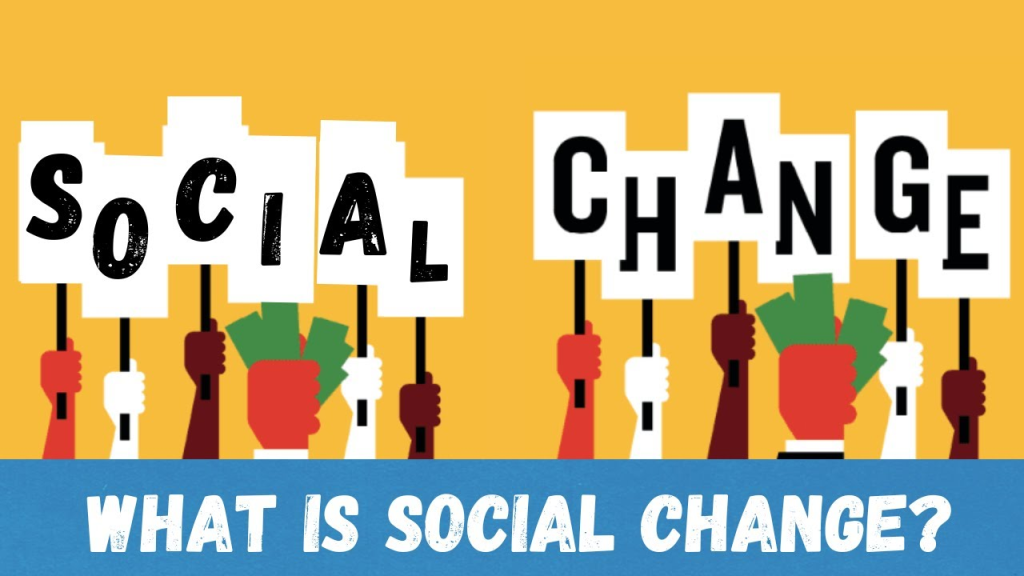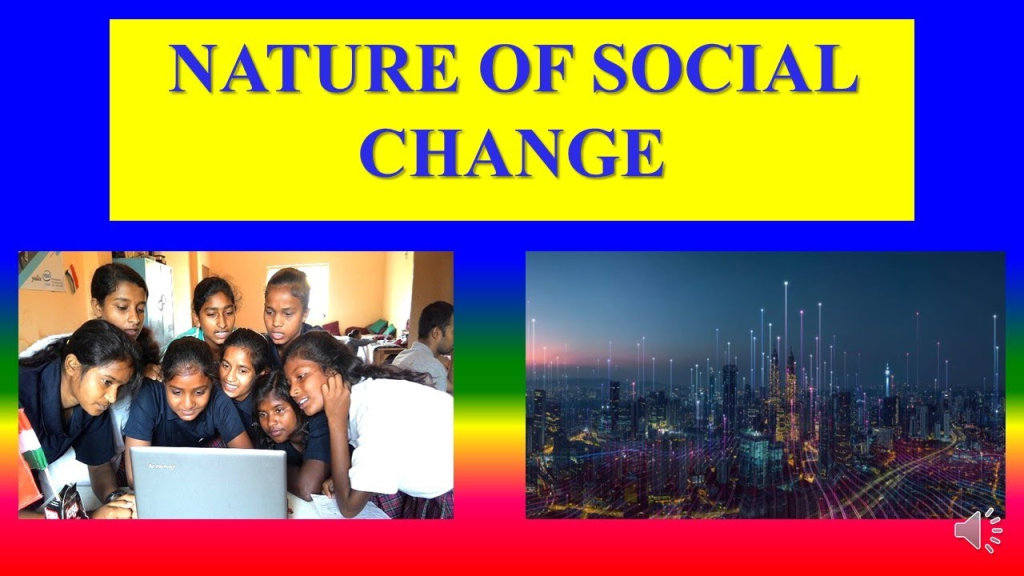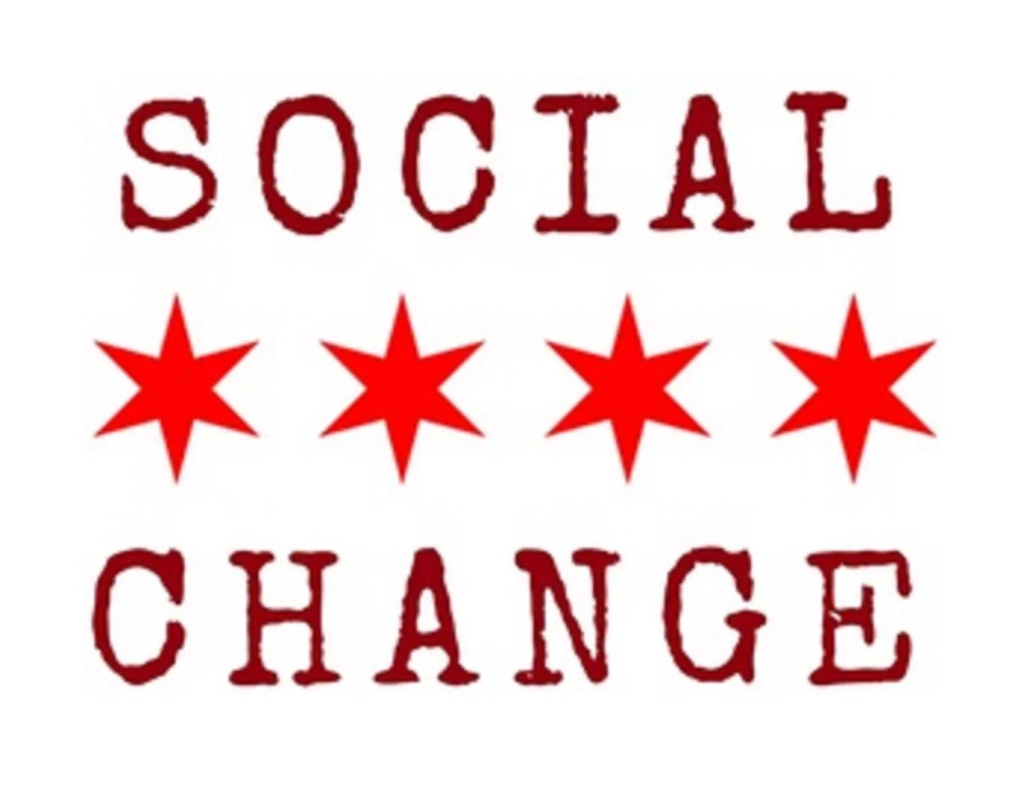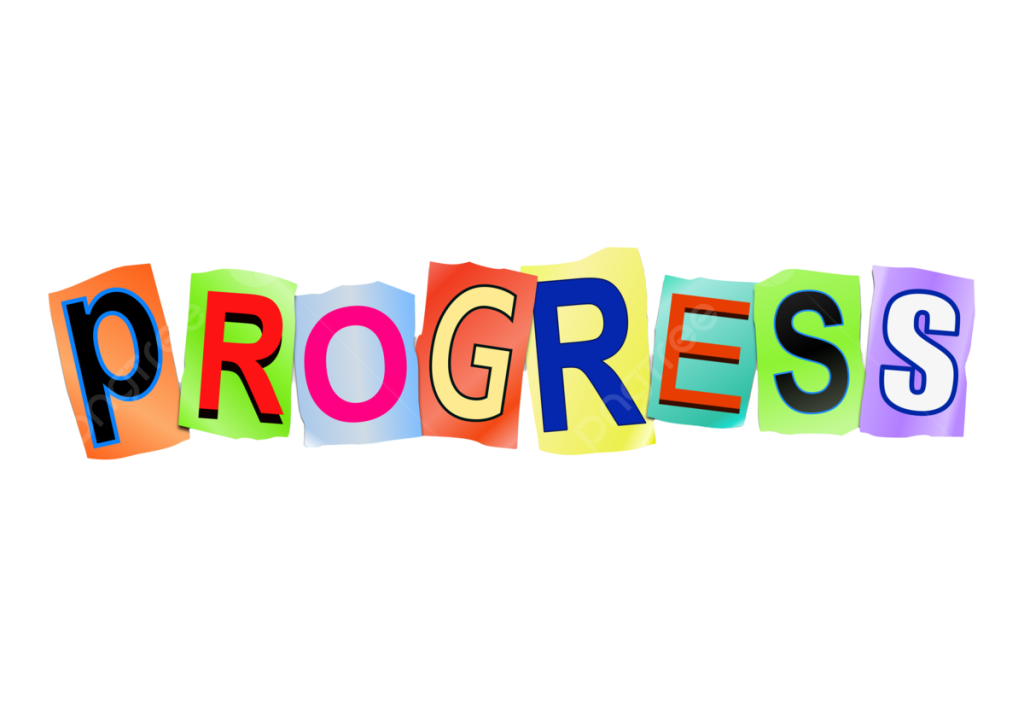ENGLISH-SOCIOLOGY UNIT 4 SOCIETY ( PART : 2 SOCIAL CHANGE)
SOCIAL CHANGE:

- SOCIAL CHANGE means a change in the way people do and think or a change in the way they live and includes changes in the structure and functioning of social forms. All of these indicate a change in social organization.
- There is a change in social relations within social organization, which means that social processes change and social patterns change.
- Social change means a change in social phenomena at the same time.
- Social change is a variation in the accepted ways of life, whether it is due to changes in geographical conditions, population structure, cultural resources, or In schools of thought and even if brought about by group intervention.
NATURE OF SOCIAL CHANGE ( Nature of Social Change):

- Social change is a continuous process as population technology values and ideologies keep changing. This is different from social changes.
- These changes are seen in all societies around the world and in the way of life of all societies.
- These changes occur naturally or due to planned efforts.
- Social changes in some societies It happens so slowly that it is not noticed and it happens quickly in some societies. This means that social changes do not happen uniformly in society, which shows that the speed of change is not uniform. It is not possible to predict social changes due to changes in time. From this, the nature of social changes can be characterized.
- Social change happens in all societies all over the world.
- Social change happens in the entire community, which means that the impact of social change is seen in that community.
- The speed and extent of change are not the same in all societies.
- The factors responsible for social change are not the same as the changes of time, that is why social change is influenced and related to the factor of time.
- Social changes are observed as a result of natural or man-made efforts.
- It is difficult to predict the forms of social change.
- Change represents a series of narrow reactions, meaning that a change in one part of the social system usually affects other and additional people until a change in the entire mode of life is observed.
- Social change It depends on factors such as technology, economic change, etc.
- Social change includes improvements in any physical group, improvements in social relations, and the acceptance of new ideas instead of old ones, etc.
- Social change is the result of a number of factors.
SOCIAL CHANGE (Social Change):

- EVOLUTION
- GROWTH
- ADAPTATION (adaptation),
- PROGRESS (progress),
- REVOLUTION (revolution),
- ACCOMMODATION (Accommodation).
EVOLUTION :

- The word evolution is derived from the Latin word.
- Evolere means to develop or to unfold.
- Evolution is a change in size and structure. It is a process in which hidden or latent characters are revealed.
- Evolution reveals different languages related to the nature of things that change while expressions work within it When changing unity must change, it means that evolution involves changing the adaptation of the object and its environment.
- The German sociologist von Baer developed the concept of evolution as a process of order and integration.
- The integration is shown by increasing the size and structure of the society, which can be seen that the structure, that is, the number or population of the society has increased along with the civilized societies.
- What evolution also includes is the progress in compatibility and diversity, which is gradual and progressive and occurs in a way that leads to large-scale evolution.
- Evolution is the process of breaking away from the norms of an old group and achieving new norms. Social evolution is not a fantasy but is real according to Maclever.
GROWTH:

- Growth means that if there is a direct change in the quantity of anything or any change, it changes.
- For example, the number of people is seen to increase, in other words, growth means an increase in population. Growth means social change in size.
ADAPTATION:

- Adaptation means adjustment to different situations.
- It is a kind of change to meet different situations. This is a kind of change to meet the changing conditions of people with modern technology and with it, in which people adapt themselves according to the situation, all this brings about a social change.
PROGRESS :

- Progress means development.
- According to Ogburn, progress is a movement towards a goal that is worked towards for a better future.
- Progress is change, but this change is in any desired or acceptable direction. It is a change. This progress should not be in any direction. There must be a specific direction of progress.
- Progress means change for the better, which indicates a value judgment. Progress includes the enhancement of dignity, respect for freedom, promotion of independence, and aesthetic enjoyment of the work of nature.
- The social life of a society is progressed when all languages move towards the desired end and when it achieves the desired goal, it is called progress.
According to Mazundar H.T., progress must have the following things.
- Enhance the dignity of man.
- A sense of respect for all mankind.
- Ever-increasing freedom for spiritual pursuits.
- Appreciative enjoyment of the works of nature.
- A social order that promotes values.
- Promoting life and freedom.
- Thus progress benefits society.
REVOLUTION (Revolution):

- Revolution means sudden and major change that brings about social change.
- The discovery of penicillin led to a revolution in medicine.
- When the life of a human being changed to think about advanced technology like computers.
ACCOMMODATION ( Accommodation ):

- Accommodation is the process of organizing one’s life in a new environment, whatever the physical and social environment, one has to make accommodations in it.
- Accommodation is a social progress. It is a change in the behavior of people that helps them to balance with the environment.
According to maclaver:
- Accommodation refers to the process that allows it to achieve a sense of harmony with the environment.
- Accommodation is a process related to social change.
- The process of social change includes growth, progress, evolution, revolution, and adaptation and accommodation, and these are all related to each other.
- Accommodation refers to the process that allows it to achieve a sense of harmony with the environment.
- Accommodation is a process related to social change.
- The process of social change includes growth, progress, evolution, revolution and adaptation and accommodation and all these are related to each other.
FACTORS AFFECTING SOCIAL CHANGE (Factors Affecting Social Change):

Social change has been observed in society which keeps happening from time to time.
This change differs from society to society, it can be fast in one society and slow in another. There are many factors that influence social change.
- Biological Factor
- Physical Factor
- Technological Factor
- Cultural Factors
Biological Factor
- Biological factors include plants, animals, and humans.
- Number of people,
- The constitution of man,
- The hereditary quality of successful generations
- The wave of happiness in society is always changing.
- This can be seen from the life in ancient times and the life of people in the present time.
- This change has come gradually.
- Only if the number of girls in the society increases, will the various forms of marriage and family Arrangements will come.
- High birth rate due to improvement in medical and sanitary conditions results in increase in population and decrease in death rate.
- With the change in the standard of living, the attitude of the people has also changed.
- The position of the woman in the family, the relationship between the family members, and the self-reliance of the family will change.
- Population growth affects the physical health and vitality of the people.
- From the above factors, it can be seen that the population Quality affects social structure and social institutions, so factors such as these include all those factors that are responsible for changes in population growth.
For example:
- Birth rate,
- Death rate,
- Infant mortality,
- Number of children and the elderly Increase,
- Inequality between male and female ratio,
- Increase in the number of disabled people,
- Increase in the number of people living in villages.
The standard of living decreases.
PHYSICAL FACTOR (Physical Causes):
Here are some types of physical causes that are responsible for changing society.
Geographical environment,
- Storm,
- Earthquake,
- Flood,
- Sudden change,
- Volcanic eruption, etc…
It has been found that the physical environment controls the social situation. The environment allows or limits the development of civilization.
geographical environment:
- Geographical environments change very slowly.
- The same geographical environment can support very different cultures,
- It has been observed that geographical settings are a man-made Part is .
- Man lives in a society with social relations.
- Therefore, in most cases, the geographical environment produces social change.
STROM (Storm) :
- Storm changes the structure, size and structure of society.
- Which also affects social relations, meaning that this can lead to social change.
EARTHQUAKES (earthquakes):
- Earthquakes cause the destruction of natural resources, and human losses.
- They result in important changes in society. Thus, social Changes occur.
FLOODS (पुर):
- Floods can give birth to new villages in place of washed away villages
- Dams will need to be built to save from floods.
- All this is leading to social change.
EPICAL CHANGES
Sometimes there are such epochal changes that raise parts of the earth’s surface, and some parts sink. These changes play a major role in the change of society.
VOLCANIC CHANGES
- Volcanic eruptions are ready for new lava.
- It causes changes in society.
MISCELLANEOUS (other factors)
- Such as temperature changes,
- There should be no availability of certain resources such as coal, iron, oil, etc.
- Lack of natural resources.
TECHNOLOGICAL FACTOR (Technological Factor):
- Technological changes are the cause of diversity in some organizations
- The advent of machine technology has not only brought about economic change but also the structure of society in the form of social groups is gradually leading to the degradation.
- Technology changes society by changing our environment.
- This change, to which we in turn adapt, is usually in the physical environment. And the adjustments that come with changes often lead to changes in customs and social institutions.

